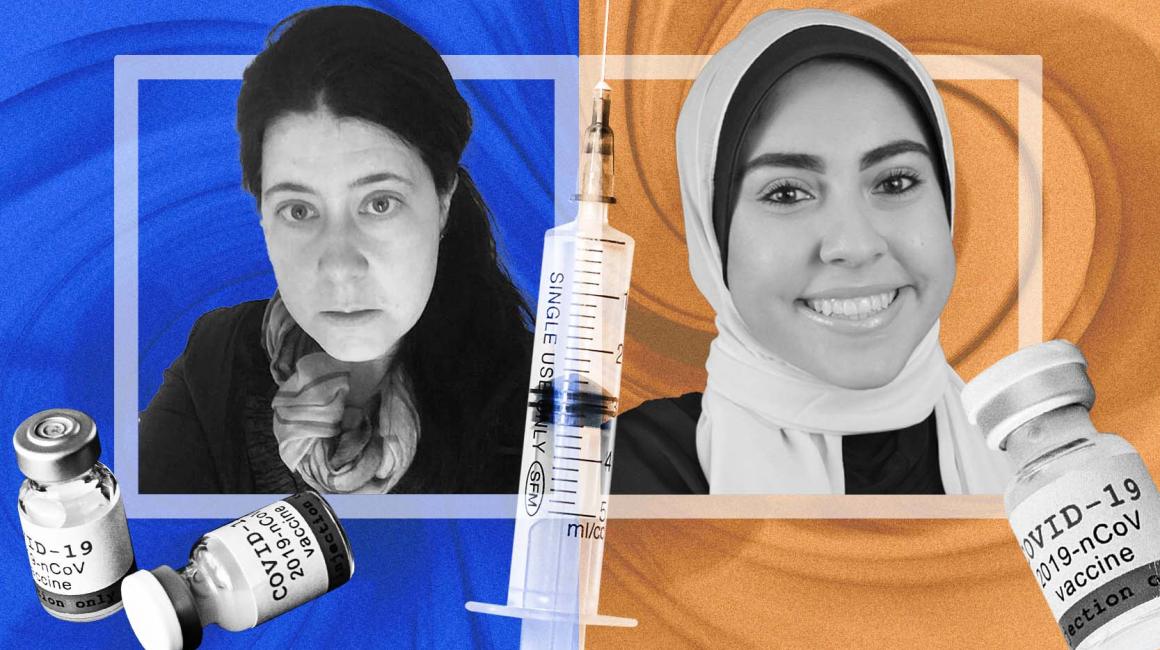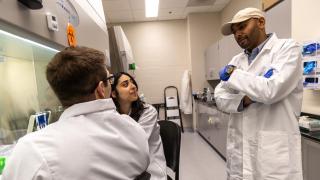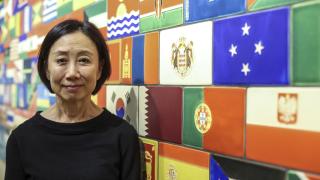
There’s a global pandemic. And scientists have found a solution to overcoming it.
But the COVID-19 vaccine, even when the nation's top immunologist says it’s safe and effective, isn’t receiving the acceptance needed to overcome the contagious respiratory virus.
To explore vaccine hesitancy and the ethics surrounding vaccination, Philosophy Assistant Professor Kriszta Sajber and Health and Human Services major Sarah Khaleefah are working side by side on vaccine-related research projects.
“Vaccination ethics answers questions that look deeper than the efficacy of the vaccine, questions that many of us have,” says Khaleefah, who recently gave an update on their work during the campus’ 2021 Summer Undergraduate Research Experience Showcase.
Their research uses premises based on the scientific findings of epidemiologists, immunologists and virologists and seeks answers to greater questions about what is valuable, beneficial and significant for human communities when it comes to COVID vaccination.
When enough people have immunity against the coronavirus, we reach the stage at which individuals susceptible to an infection become indirectly protected from the virus. This is called herd immunity: virus spread would slow and it would benefit everyone. Not only those who were vaccinated, but those who cannot obtain immunity through vaccination would be better protected, including the immunocompromised and children under the age of 12.
So it’s important to ask the question, “If we know the conditions under which we can create herd immunity, what actions are ethical to take for each of us individually?,” Sajber said. “When people approach this from their individual perspective, they tend to forget that the ‘herd’ can also come together to protect the individual.”
The UM-Dearborn researchers say philosophical research can help people find clarity in complicated situations and any concerns about the ethics of vaccination can be sorted out by looking at the logic of the arguments.
For example, if someone says that it is their right to refuse a vaccine, ethicists begin with the facts — not opinions or emotional reactions — to examine the claim.
“There are documented cases in which one person’s decision to refuse the coronavirus vaccine was the proven cause of coronavirus outbreaks in a nursing home or in family settings leading to deaths or severe illness among vaccinated individuals,” Sajber says.
With that known, Sajber works through the right-to-refuse argument. “When someone medically eligible with access to vaccinations does not accept a vaccine, they reserve to themselves the right to harm others. However, no one has the right to harm others. People do harm others from time to time, but we cannot say that this is their right. Therefore, from an ethical perspective, no one has a ‘right’ to refuse a vaccine. As a medical ethicist, my job is to examine the logic behind a claim like this.”
Sajber said her work isn’t meant to be overly demanding when it comes to vaccination — it’s to help people recognize that there are processes and tools out there to help make sense of our roles in limiting the damage of the coronavirus.
Khaleefah, a junior who plans to have a career in medicine, says she’s personally seen how complicated the issue of vaccination can be. There are discussions occurring at her mosque and in her family both for and against the COVID-19 vaccine.
“Religion is a huge part of my life. (Religious) scholars in my community are advocating for vaccines. But some people are still refusing to vaccinate,” she says. “Upon further investigation through interviews and literature review, I’ve learned that people are genuinely confused, scared, misinformed or haven’t found the answers they are looking for in order to opt in to vaccination. The answers are out and there are people who will listen, but not if you judge what they are feeling or make it about you. From either perspective (for or against), it’s not an individual issue, it’s a collective one.”
For Khaleefah’s research contribution, she’s combined contemporary scholarship in public health ethics with sources on the healthcare-related obligations implicit in the religious worldview of Islam. Her goal? To demonstrate the potential of a religiously-grounded vaccination ethics to assist with patient outreach, improve healthcare provider-patient relationships, and promote individual health and well-being in culturally and religiously diverse communities.
“I am grateful to have had this research experience. Dr. Sajber’s guidance is preparing me to go out and serve my community to the best of my ability.”
Khaleefah — who stood out as an outstanding student in Sajber’s Medical Ethics (PHIL 442/HHS 442) course and was later approached to take part in this research endeavor — is continuing her work with Sajber into the Fall 2021 semester. She wants healthcare professionals to understand the cultural viewpoint of Muslim patients because cultural literacy helps develop stronger patient-physician relationship and creates better health outcomes.
Sajber said the research Khaleefah’s done on campus will help guide her as she continues her path toward medical school and serving in the healthcare field.
“Sarah is passionate about healthcare and has learned how to develop informed, logically organized, conceptually nuanced and meticulously developed answers to complicated questions,” Sajber said. “Philosophy trains its practitioners to use the logical tools available to clarify bold questions and to apply their rational faculties to submit them to analysis. Medical schools are interested in people with this training because it shows that students are prepared to meet life’s challenges in the broadest possible sense of the term.”
Khaleefah says understanding vaccine ethics also helps us make sense of the vaccine policies and mandates we are beginning to see.
“If a person doesn't understand the ethics of vaccination, they might feel like a decision was unjust, even though it was the best decision for the group and we actually have a moral obligation to protect others,” Khaleefah says. “This research is very relevant and extremely important as we see science attempt to battle more and more infectious diseases with vaccines.”
With all of the divisive confusion about our role in overcoming the pandemic, Sajber says there’s one thing a worldwide virus has made abundantly clear: a newly apparent biological interdependence that characterizes humanity as a whole. The world would be a better place if we’d unite and fight the pandemic instead of each other.
“When I engage with people about vaccine hesitancy, many times their argument is aimed at denying what was revealed so painfully by the pandemic: the biological interdependence that inevitably ties us together. People want to make an individual choice or have autonomy,” she said. “But our vulnerability to have our bodies taken over and used by a virus is the very definition of not being autonomous. Getting vaccinated is, in fact, one of the few choices we have available to free ourselves from the lack of moral or personal agency that the pandemic forced upon us.”
Article by Sarah Tuxbury. If you are a member of the media and would like more information about “The Ethics of COVID Vaccination” research project, contact [email protected].




